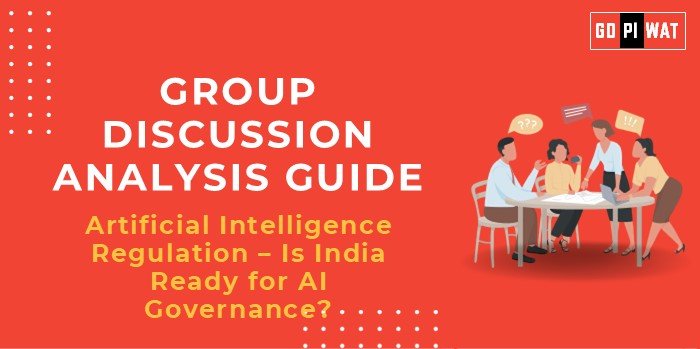📋 Group Discussion Analysis Guide: Artificial Intelligence Regulation – Is India Ready for AI Governance?
🌐 Introduction to Artificial Intelligence Regulation
Artificial Intelligence (AI) is revolutionizing industries worldwide, influencing governance, economies, defense, and public services. The rapid evolution of AI presents significant challenges in regulation, a concern that nations, including India, are actively addressing.
In India, the discourse on AI regulation has intensified due to concerns over data privacy, algorithmic bias, job displacement, and national security. While AI applications have expanded in sectors like healthcare and finance, issues related to ethical use, transparency, and accountability persist.
📊 Quick Facts and Key Statistics
- 🌍 Global AI Market Size: Projected to reach $407 billion by 2027, indicating substantial economic growth potential.
- 🇮🇳 AI Adoption in India: Approximately 30% of Indian companies are maximizing value through AI, surpassing the global average of 26%.
- 📈 India’s AI Market Projection: Expected to grow by 28.63% annually from 2024 to 2030, reaching a market volume of $28.36 billion by 2030.
- 📜 Data Regulation Status: The Digital Personal Data Protection Act was enacted in 2023, marking progress in data governance.
- 💼 AI Workforce: India boasts a significant AI talent pool, with a growing number of professionals specializing in the field.
🔍 Stakeholders and Their Roles
- 🏛️ Government: Formulates policy frameworks and regulations, exemplified by NITI Aayog’s AI initiatives.
- 🏢 Private Sector: Drives innovation through the development and commercialization of AI solutions, setting industry standards.
- 🎓 Academia and Think Tanks: Engage in AI research, provide ethical guidelines, and assess societal impacts.
- 🛡️ Civil Society Organizations: Advocate for ethical AI use, data privacy, and digital rights.
- 🌍 International Bodies: Establish global AI norms, such as UNESCO’s AI Ethics guidelines.
🏆 Achievements and Challenges
✨ Achievements:
- 📑 Policy Initiatives: NITI Aayog’s ‘AI for All’ strategy promotes responsible AI use.
- 🚀 Startup Ecosystem: India hosts a burgeoning AI startup ecosystem, fostering innovation.
- ⚙️ AI in Public Services: Implementation of AI-driven systems like DigiLocker and facial recognition in governance.
⚠️ Challenges:
- ⚖️ Ethical and Legal Gaps: Absence of a comprehensive AI regulatory framework.
- 🔍 Data Bias: Instances of AI systems exhibiting bias, affecting fairness.
Global Comparisons: The European Union’s AI Act, passed in May 2024, serves as a comprehensive legal framework regulating AI, establishing common rules within the EU.
📄 Case Study: The AI-enabled CoWIN portal in India demonstrated effective use of technology but also highlighted data privacy concerns.
🗣️ Structured Arguments for Discussion
Supporting Stance: “India’s initiatives, such as the ‘AI for All’ strategy, indicate readiness for AI governance, with robust public-private partnerships driving ethical AI development.”
Opposing Stance: “Despite efforts, India lacks a comprehensive AI governance framework, and regulatory capacity remains inadequate compared to global standards.”
Balanced Perspective: “India’s progress in AI policy is commendable; however, effective governance necessitates a stronger regulatory framework, ethical oversight, and alignment with international norms.”
🎯 Effective Discussion Approaches
- 💬 Opening Approaches:
- 🛠️ “AI has the potential to transform India’s economy but requires careful regulation to mitigate risks of misuse and bias.”
- 🔍 “With AI’s rapid advancement, India faces the dual challenge of fostering innovation while ensuring ethical governance.”
- 🔄 Counter-Argument Handling: “While critics point to India’s regulatory gaps, recent focus on ethical AI and data protection laws marks a positive trajectory.”
🔍 Strategic Analysis of Strengths and Weaknesses
- 💪 Strengths:
- 👨💻 Large AI talent pool.
- 📑 Emerging AI policy initiatives.
- ⚠️ Weaknesses:
- 🛑 Limited regulatory capacity.
- 🔒 Gaps in ethical oversight.
- 🌟 Opportunities:
- 🚀 AI-driven transformation in public services.
- 🌍 Potential for global leadership in AI.
- ⚠️ Threats:
- ⚖️ Algorithmic bias.
- 📊 Pressure from international competition.
🎓 Connecting with B-School Applications
Real-World Applications: AI governance is critical for B-school projects in risk management, regulatory strategy, and business ethics.
Sample Interview Questions:
- 🤔 “What role does regulation play in balancing AI innovation and ethical risks?”
- 🌏 “How can India position itself as a leader in global AI governance?”
Insights for B-School Students: Understanding AI regulation is essential for navigating strategic, ethical, and operational challenges across various sectors, including finance and supply chain management.


